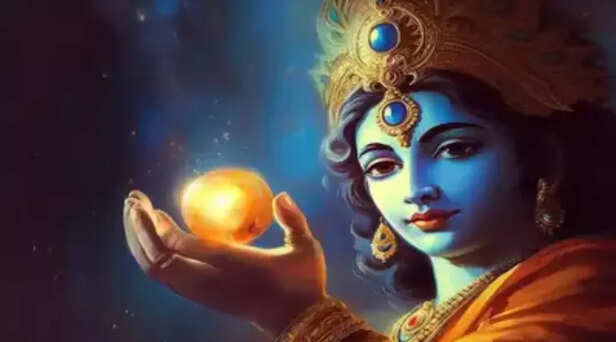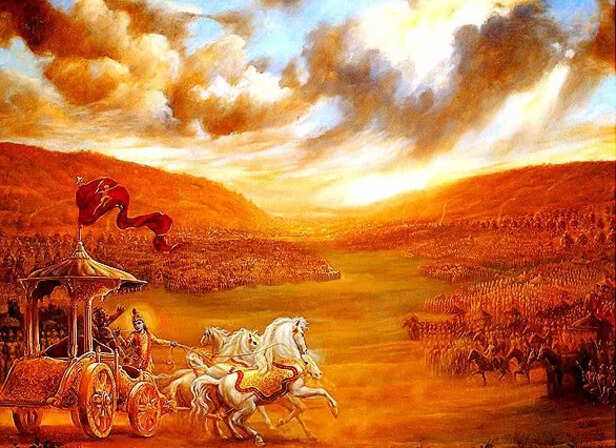The Good Lawyer Knows the Law, The Clever One Knows the Judge—A Hindu Diplomatic Way of Life
Ankit Gupta | May 04, 2025, 10:53 IST
Unbound Devotion
The Katha Upanishad says: "Shreyo hi jnānam atyantam preyo mando’dhi gamyate" — "The ignorant choose what is pleasant (preya), the wise choose what is beneficial (shreya)." Cleverness chases preya (pleasant), while wisdom pursues shreya (beneficial in the long run).
"The good lawyer knows the law, the clever one knows the judge." This aphorism, often tossed with a grin, captures a cynical truth about modern systems of justice, influence, and power. It points to a subtle but dangerous distinction between legitimate knowledge and strategic manipulation. But what does Hindu philosophy, with its deep reflections on dharma (righteousness), jnana (wisdom), and karma (action), say about this dichotomy? In a world where cleverness is often rewarded more visibly than goodness, Hindu scriptures remind us that true victory lies not in exploiting loopholes but in aligning with cosmic law.

Cleverness is often defined as the ability to think quickly, manipulate situations, and achieve results through ingenuity. In contrast, wisdom in the Hindu tradition is viveka — the discrimination between the real and the unreal, the eternal and the temporary. The former operates in the world of vyavaharika (relative reality), while the latter seeks the paramarthika (absolute reality).
Bhagavad Gita 4.38 states:
"na hi jnānena sadṛśaṁ pavitram iha vidyate | tat svayaṁ yoga-saṁsiddhaṃ kālenātmani vindati ||"
"There is nothing in this world as purifying as knowledge. One who is perfected in yoga realizes it in due time within himself."
While cleverness may help one escape a trial, gain a client, or win an argument, the Gita warns that only inner knowledge can liberate the soul.

Shakuni, the maternal uncle of the Kauravas, was the epitome of political cunning. He manipulated the dice game to rob the Pandavas of their kingdom and honor. For a while, his cleverness seemed to triumph. But in the end, his strategies only hastened the destruction of the Kaurava dynasty. The Mahabharata shows that cleverness devoid of dharma ultimately leads to self-destruction.

In contrast, Vidura, the half-brother of Dhritarashtra, was the voice of wisdom. Though politically powerless, he remained aligned with righteousness. His counsel to Dhritarashtra is filled with the essence of dharma. He once said:
"Dharma protects those who protect it. Those who destroy dharma are themselves destroyed by it."
This echoes the famous shloka from Shanti Parva (12.321.18):
"Dharma eva hato hanti dharmo rakṣati rakṣitaḥ | Tasmād dharmo na hantavyo mā no dharmo hato'vadhīt ||"
According to Manusmriti 8.15:
"Nābhyasopārjitaṭ vidyā na ca dharmeṇa sañcitam | Naiva tiṣṭhati tenārthaṁ paśyed bhūtiṇ tathāvidhām ||"
"Knowledge not gained through discipline and wealth not earned through dharma do not last."
In modern terms, cleverness may find shortcuts to gain wealth or prestige, but without ethical grounding, these gains are temporary. The Upanishads call such knowledge "aparavidya" — lower knowledge, concerned with form and function. True wisdom, or paravidya, leads to moksha (liberation).

In today's judicial systems, lawyers often face a moral dilemma: Should they stick to the truth or use loopholes to serve their client? The courtroom becomes a modern-day Kurukshetra. The Gita addresses such conflicts:
Bhagavad Gita 2.47:
"Karmanye vadhikaraste ma phaleshu kadachana"
"You have the right to perform your duty, but not to the fruits thereof."
This encourages detachment from outcomes and a focus on righteous action. The clever lawyer seeks to win at all costs. The wise one focuses on justice, knowing that truth has its own reward, even if not immediately visible.

A nuanced question arises: What about Krishna, who used "strategic cleverness" in the Mahabharata? From breaking the rules of war to guiding Arjuna in morally grey areas, Krishna seems to blur the line between cleverness and wisdom.
However, Krishna's actions were rooted in a cosmic dharma. His cleverness was not for personal gain but to restore balance. As he declares in the Gita:
Bhagavad Gita 4.8
"Paritranaya sadhunam vinashaya cha dushkritam dharma-samsthapanarthaya sambhavami yuge yuge"
"To protect the righteous, destroy the wicked, and establish dharma, I manifest in every age."
Thus, Krishna's "cleverness" is better understood as divine wisdom in action — yukti that upholds satya.
Yes, but only if cleverness is yoked to dharma. Strategic thinking is not wrong. But the Gita warns against using it to serve ego, greed, or adharma. A wise lawyer may know the judge, but will not manipulate justice. Instead, they will act with integrity, uphold truth, and accept results as prasad (grace).
The Yoga Vasistha offers guidance:
"He who acts skillfully in the world without attachment, yet keeps his mind in Brahman, is the true yogi."
In this light, true advocacy is not about "winning cases," but about restoring justice and harmony in society.
In the end, Hindu philosophy draws a clear line: cleverness may grant success, but only conscience grants liberation. Manipulating a judge may win a case, but violating dharma accrues karma. The wise choose a higher law, not because it's easy, but because it's eternal.
As the Gita, Mahabharata, and Manusmriti teach us: the greatest power is not cleverness, but clarity — of mind, motive, and dharma. Let the modern lawyer, and indeed all of us, not just know the law or the judge, but know ourselves, the true self, the Atman.
Because in the divine court of karma, it is not whom you know, but who you are that truly matters.
Cleverness vs Wisdom

Crux of the Contrast
Cleverness is often defined as the ability to think quickly, manipulate situations, and achieve results through ingenuity. In contrast, wisdom in the Hindu tradition is viveka — the discrimination between the real and the unreal, the eternal and the temporary. The former operates in the world of vyavaharika (relative reality), while the latter seeks the paramarthika (absolute reality).
Bhagavad Gita 4.38 states:
"na hi jnānena sadṛśaṁ pavitram iha vidyate | tat svayaṁ yoga-saṁsiddhaṃ kālenātmani vindati ||"
"There is nothing in this world as purifying as knowledge. One who is perfected in yoga realizes it in due time within himself."
While cleverness may help one escape a trial, gain a client, or win an argument, the Gita warns that only inner knowledge can liberate the soul.
Stories from the Epics: When Cleverness Failed and Wisdom Triumphed
Shakuni

Clever Villain
Shakuni, the maternal uncle of the Kauravas, was the epitome of political cunning. He manipulated the dice game to rob the Pandavas of their kingdom and honor. For a while, his cleverness seemed to triumph. But in the end, his strategies only hastened the destruction of the Kaurava dynasty. The Mahabharata shows that cleverness devoid of dharma ultimately leads to self-destruction.
Vidura

Wise Counsellor
In contrast, Vidura, the half-brother of Dhritarashtra, was the voice of wisdom. Though politically powerless, he remained aligned with righteousness. His counsel to Dhritarashtra is filled with the essence of dharma. He once said:
"Dharma protects those who protect it. Those who destroy dharma are themselves destroyed by it."
This echoes the famous shloka from Shanti Parva (12.321.18):
"Dharma eva hato hanti dharmo rakṣati rakṣitaḥ | Tasmād dharmo na hantavyo mā no dharmo hato'vadhīt ||"
Scriptural Commentary: Cleverness is Not Intelligence
"Nābhyasopārjitaṭ vidyā na ca dharmeṇa sañcitam | Naiva tiṣṭhati tenārthaṁ paśyed bhūtiṇ tathāvidhām ||"
"Knowledge not gained through discipline and wealth not earned through dharma do not last."
In modern terms, cleverness may find shortcuts to gain wealth or prestige, but without ethical grounding, these gains are temporary. The Upanishads call such knowledge "aparavidya" — lower knowledge, concerned with form and function. True wisdom, or paravidya, leads to moksha (liberation).
Courtroom as Kurukshetra

Dharma and Justice
In today's judicial systems, lawyers often face a moral dilemma: Should they stick to the truth or use loopholes to serve their client? The courtroom becomes a modern-day Kurukshetra. The Gita addresses such conflicts:
Bhagavad Gita 2.47:
"Karmanye vadhikaraste ma phaleshu kadachana"
"You have the right to perform your duty, but not to the fruits thereof."
This encourages detachment from outcomes and a focus on righteous action. The clever lawyer seeks to win at all costs. The wise one focuses on justice, knowing that truth has its own reward, even if not immediately visible.
Krishna and the Law of Dharma

Divine Cleverness?
A nuanced question arises: What about Krishna, who used "strategic cleverness" in the Mahabharata? From breaking the rules of war to guiding Arjuna in morally grey areas, Krishna seems to blur the line between cleverness and wisdom.
However, Krishna's actions were rooted in a cosmic dharma. His cleverness was not for personal gain but to restore balance. As he declares in the Gita:
Bhagavad Gita 4.8
"Paritranaya sadhunam vinashaya cha dushkritam dharma-samsthapanarthaya sambhavami yuge yuge"
"To protect the righteous, destroy the wicked, and establish dharma, I manifest in every age."
Thus, Krishna's "cleverness" is better understood as divine wisdom in action — yukti that upholds satya.
Practical Implications: Can a Lawyer Be Both Clever and Wise?
The Yoga Vasistha offers guidance:
"He who acts skillfully in the world without attachment, yet keeps his mind in Brahman, is the true yogi."
In this light, true advocacy is not about "winning cases," but about restoring justice and harmony in society.
From Cleverness to Conscience
As the Gita, Mahabharata, and Manusmriti teach us: the greatest power is not cleverness, but clarity — of mind, motive, and dharma. Let the modern lawyer, and indeed all of us, not just know the law or the judge, but know ourselves, the true self, the Atman.
Because in the divine court of karma, it is not whom you know, but who you are that truly matters.
